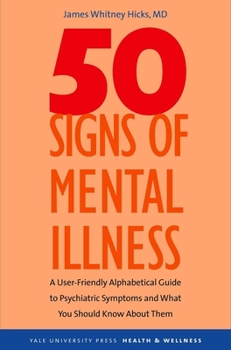50 Signs of Mental Illness
(Part of the Yale University Press Health & Wellness Series)
Select Format
Select Condition 
Book Overview
A user-friendly, alphabetical guide to psychiatric symptoms and what you should know about them. Anger, fatigue, obsessions, memory loss, sexual performance problems, suicidal thoughts. Are these signs of mental illness? How can you tell? Should you consult your physician? This reassuring book is for anyone seeking to understand their own symptoms or those of a loved one. "A smart, alphabetically arranged layperson's guide to common symptoms."--Gregory Mott, Washington Post "Each of us has experienced one or several of the various forms of emotional distress described in this enormously helpful book--and who has not worried about their meaning and sometimes wondered whether, or how, to seek treatment? Finally, here is the book that answers every question lucidly, directly and authoritatively."-- Sherwin B. Nuland, M.D., author of Lost In America: A Journey With My Father and How We Die "This resource on the symptoms of mental illness and their treatment is a solid gem."--Library Journal
Format:Paperback
Language:English
ISBN:0300116942
ISBN13:9780300116946
Release Date:June 2006
Publisher:Yale University Press
Length:416 Pages
Weight:1.35 lbs.
Dimensions:1.1" x 6.1" x 9.2"
Customer Reviews
5 ratings
A tremendously helpful book
Published by Thriftbooks.com User , 19 years ago
If you are interested in this book, be sure to skip down to all of the reviews. Don't be put off by the two simultaneously posted negative reviews. If you want more information, go to www.fiftysigns.com where you will find the complete introduction to the book, excerpts from each of the 50 chapters, reviews from The Washington Post, Library Journal and The Baltimore Sun, and a helpful page of mental health links. The following is from the author's newsletter on his web site: "Nearly everyone has experienced depression, anxiety, stress, trouble sleeping and other symptoms of mental illness. But almost everyone thinks of these as personal failings or existential problems rather than as health issues with potential treatments... But effective treatments exist, and you can feel much better after a simple trip to a doctor or counselor. We should be able to recognize the signs of mental stress in our lives in the same way that we monitor our blood pressure and cholesterol."
Excellent, comprehensive reference
Published by Thriftbooks.com User , 19 years ago
As an internist I have frequently been approached by patients, family and friends for advice in assessing mental health symproms in a loved one. This is the ready reference I wish I had had available at those times times when I struggled to provide useful information without resorting to professional jargon or simplistic explanations. Dr. Hicks dissects the complex symptoms of mental illness as described in medical texts, placing them within the context of the familiar everyday experience without losing their clinical significance. The writing is clear and succint; the non-intimidating style makes the information readily accessible to the reader.
Great education tool
Published by Thriftbooks.com User , 19 years ago
Language is a tool of psychiatry. Yet, one of the major difficulties that one encounters when practicing psychiatry is the imprecision of terms used to describe various signs and symptoms. Some of the concepts used by psychiatrists and other mental health professionals come from common usage and describe common human feelings and behaviors. Then a question arises: When do anger, anxiety, stress become signs of illness? Other terms, usually derived from Latin or Greek, can intimidate with ominous associations. Certain schools of psychiatry create a vocabulary firmly rooted in an underlying theoretical system and words are given specifically defined meanings. Psychiatric researchers use rating scales to define signs and symptoms by quantifying them. Dr. Hicks' approach is to explain the term by contextuliazing it, and by exposing the full spectrum of associated meanings. He does it using a warm, understandable and highly readable language. Dr. Hicks wrote this wonderful psychiatric dictionary primarily for non-professionals, for patients and their families. However, as an educator, I immediately recognized its usefulness as a teaching tool. In my work with medical students, I always emphasize that they speak with their patients in a language the patients understands and to always make sure that they, as a therapist and the patient mean the same thing by the concepts they use. I urge them to explore what it means for the patient when he or she says: "I am depressed." Dr. Hicks' book provides, I believe, a guide to the novice in the trade of psychiatry and psychotherapy to help him or her communicate with his or her patient, to help him or her explore the patient's symptoms using the patients' own language. That is why I have started to recommend this book to my medical students. It fills the gap that traditional psychiatric textbooks generally leave unaddressed.
Great Starter Book
Published by Thriftbooks.com User , 19 years ago
For those who are intimidated by the vast body of professional literature out there on mental illness, but want to get past the simplistic and repetitive self-help guides, this is the book for you. Pick the chapters that interest you and dig in for a comprehensive overview of the subjects. This is an easy and interesting read, and a good book for skimming. You will probably want to move on to more detailed books on the subjects that interest you later. Hicks also includes a helpful reference section at the back of the volume.
Incredible Read
Published by Thriftbooks.com User , 19 years ago
I highly recommend this book. I started out reading the sections that address my own 'issues,' and was blown away by the insight and detail provided. Then, in thumbing through the other chapters, I was further drawn in and became completely absorbed in the book as a vehicle to understanding those around me. This book is also incredibly well written and easy to read or skim.





